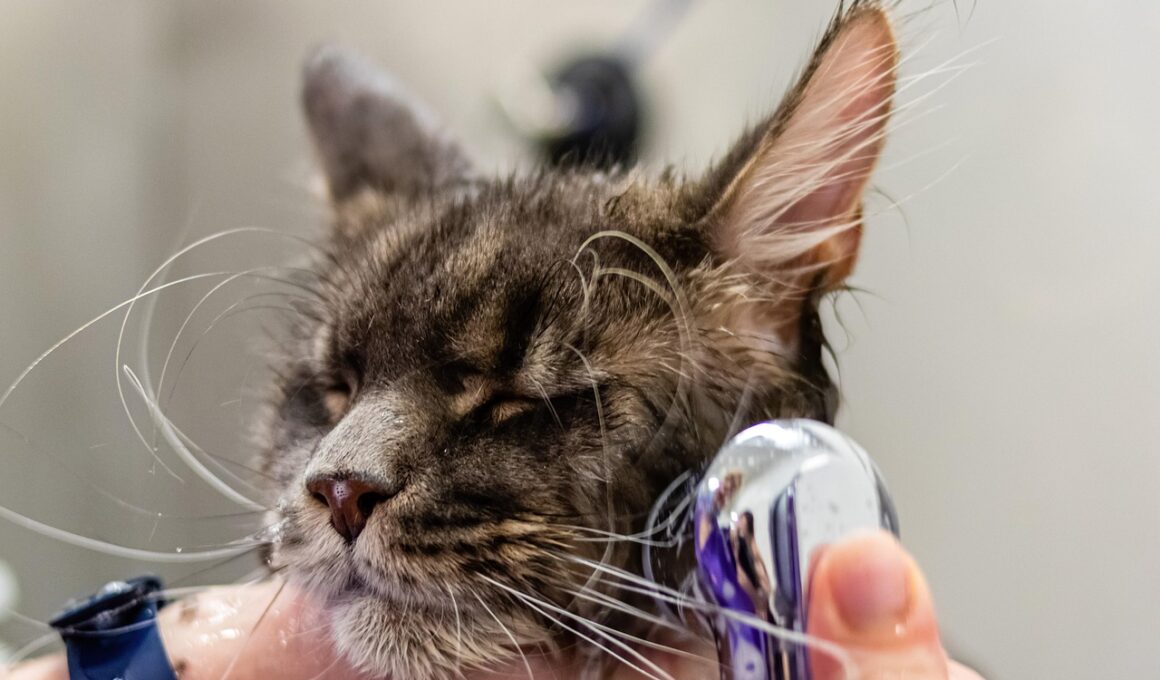Managing Stress During Veterinary Visits for Senior Cats
Veterinary visits can be stressful for senior cats, primarily due to their age, health conditions, and sensitivity to unfamiliar environments. Certain measures can significantly help in reducing anxiety during these appointments. Preparing your cat beforehand creates a sense of security. Use their carrier as a safe space at home well before the visit. Regular familiarity with the carrier can promote comfort, making it less intimidating. Additionally, maintaining a consistent routine around the visit will ease their anxiety. Feeding, playing, and resting at similar times can provide a sense of predictability in their day. The day of the appointment, consider using soothing pheromone sprays, which can create a calming atmosphere for your cat in the carrier. Bring along their favorite blanket or toy. These familiar items can invoke feelings of safety and calm. It’s essential to stay calm yourself. Cats are sensitive to emotions and may pick up on your stress. Overall, your demeanor affects them greatly. Understanding these strategies can ensure that you manage stress effectively during veterinary visits for your senior cat.
Prioritizing the right timing for your senior cat’s veterinary visit is also crucial. Scheduling appointments during quieter times at the clinic can greatly reduce anxiety for both you and your cat. Early mornings or late afternoons are usually better than busy weekends when the facility is crowded. Consider whether the clinic offers specific hours for senior pets, as some clinics have programs aimed specifically at older animals. Alongside timing, ensuring your cat is calm before leaving home is essential. Play with them and engage in comforting activities to help them feel safe and relaxed. Before entering the clinic, allow your cat to explore the surroundings and observe other animals from a distance. Make sure to take breaks if your cat shows signs of stress, such as panting or whining. If you’re facing challenges, discuss your concerns with your veterinarian. They can provide helpful suggestions or medication options tailored for more anxious senior cats. Remember, communicating with your vet about any previous stress signals can help create a supportive environment for your cat’s needs.
Understanding Senior Cat Stress Indicators
Recognizing the signs of stress in senior cats is vital for your handling and care during veterinary visits. Cats communicate discomfort in various ways, including hiding, excessive grooming, or vocalizations. When a senior cat shows abnormal behavior, it often indicates stress. Some senior cats may become reluctant to leave their carriers or cling to their owners excessively. Observing these signs can provide immediate cues on their comfort level. Monitor physical responses as well; changes in breathing patterns or unusual body language are critical indicators. Becoming aware of your cat’s usual demeanor versus their stressed state can help you understand their behavior better. A stressed cat might also exhibit aggression, growling, or hissing, particularly in unfamiliar settings, such as a vet clinic. It’s essential to remain patient and acknowledge these behavioral changes. Provide comfort through gentle petting or soft-spoken reassurance to help alleviate their worries. Your attentiveness and willingness to adapt to their needs can have a significant impact on their overall experience. Regularly checking in for updates on stress management can foster a healthier relationship with your senior cat in stressful situations.
Entering the veterinary clinic can be overwhelming for many senior cats, particularly due to the presence of other animals and unfamiliar smells. To reduce this stress further, choose a carrier that is well-ventilated, quiet, and provides ample room for movement. Secure the carrier in your vehicle using seatbelts to minimize unnecessary movement during the journey. It is also helpful to line the carrier with bedding or fabrics from home to create a comforting environment. During the visit, try to limit interactions with other animals, particularly if your cat shows signs of anxiety about their presence. If possible, request to be seen in a quieter area of the clinic. Make sure to inform the clinic staff that your cat is a senior pet to ensure they take extra care and handle them gently. Regular veterinarian visits can help maintain your senior cat’s health, but minimizing their anxiety during these trips is equally vital. Always focus on your cat’s overall well-being and comfort during these appointments. By advocating for a stress-reduced experience, you ensure their health remains a priority while addressing their emotional needs.
Post-Veterinary Visit Care
After the veterinary visit, your priority should be ensuring your senior cat’s comfort and recovery. Provide a serene environment for them to unwind, allowing them to return to familiar activities, whether playing or enjoying quiet time in their favorite spot. Activities should return to normalcy as quickly as possible to minimize stress caused by disruption. If your veterinarian administered any vaccines or medications, monitor your cat closely for adverse reactions or changes in behavior. Understanding their health needs is essential, particularly after visiting a vet clinic. Offer plenty of fresh water and meals; maintain the diet your cat enjoys. Give them time alone to process the experience, as some cats may seek solitude following stressful events. Providing a calm and encouraging space helps them acclimatize back to their routine, making the transition smoother. Take note of any lingering stress signs and discuss them with your vet if needed. Your nurturing presence can further alleviate their post-visit anxiety. Familiarity and routine create a comforting atmosphere that encourages your elderly cat to feel secure and relaxed after visiting the veterinarian.
Implementing calming practices prior to and after veterinary visits can make a significant difference in managing stress levels for senior cats. One effective method is using natural remedies. Herbal supplements or calming chews can be beneficial, but always consult with your veterinarian before introducing new products. Consider incorporating practices such as gentle massage or soothing touches to ease tension. These methods foster trust between you and your cat, allowing them to feel more secure, particularly in stressful times. Creating a comfortable post-visit experience might include spending extra time cuddling or engaging in light play with them. This bonding time is essential, as it reassures your cat of your presence and support. You may also use music or ambient sounds known to calm pets, creating a soothing background vibe during recovery. Understanding your senior cat’s unique personality and preferences helps tailor the approach to their needs. The more comfortable and secure they feel in your presence, the better they will cope with the stresses of veterinary visits in the future. Remember, every cat is different, and individualized care will go a long way.
Conclusion: Ongoing Stress Management for Senior Cats
Managing stress for senior cats extends beyond veterinary visits. Regularly assessing their overall living environment can reduce stress effectively. Make adjustments to their home, creating spaces where they can retreat for quiet time away from noise or vibrant activities. High places or cozy corners can serve as sanctuaries. Avoid handling them aggressively or forcing interactions, allowing them to dictate their interactions with you and their surroundings. Providing mental stimulation through puzzle toys or interactive play can also alleviate stress. These activities will keep their minds sharp, promote physical activity, and bond with their owners enhancing their emotional well-being. Regular check-ins with the veterinarian ensure ongoing health monitoring and preventive care. Discuss any health changes, as senior cats may develop new stress signals as they age. Your knowledge on maintaining their emotional and physical health is crucial in providing a comfort-focused lifestyle. Regular collaboration with your veterinarian regarding behavior and health changes can equip you with valuable strategies. Stress management is essential for the well-being of your senior cat, allowing them to live their golden years comfortably and enjoyably.
Each cat is unique in its response to stress, so being attuned to your senior cat’s individual needs is important. Pay continual attention to their body language, actions, and habits to help create a tailored approach. Establishing a strong bond based on trust and understanding will allow your cat to thrive. Engage in specific activities they enjoy, thereby reinforcing positivity in their experiences. With time and patience, you will find a balance that suits both you and your pet. Ultimately, the goal is to make veterinary visits a smoother, less stressful experience. Consistently practicing relaxation techniques, regular vet check-ups, and ensuring emotional support will lead to an improved overall health journey for your feline friend.


